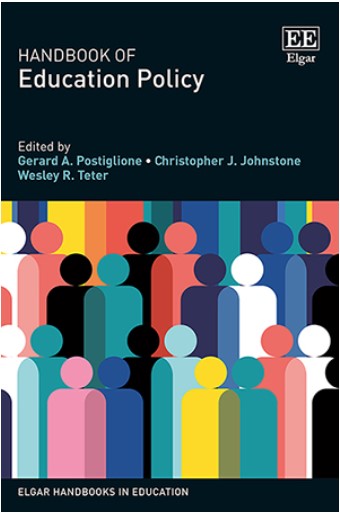HANDBOOK OF EDUCATION POLICY
Edited by
Gerard A. Postiglione (Professor Emeritus, Honorary Professor, The University of Hong Kong)
Christopher J. Johnstone (Associate Professor, University of Minnesota, US)
Wesley R. Teter (Research Fellow, Center for Advanced School Education and Evidence Based Research, University of Tokyo, Japan)
Publisher : Edward Elgar Publishing
Click here to learn more about purchasing
‘The new Handbook of Education Policy edited by Postiglione, Johnstone and Teter is a welcome addition to the academic literature on the transformation of education policy in the aftermath of the COVID-19 pandemic. The 22 chapters of this well-researched book give a comprehensive analysis of how education policy must adapt to a radically changed world. Through a skilful combination of thematic pieces and case studies from a large range of countries, the chapter authors challenge us to embrace new education policy concepts, such as public value governance and knowledge democratization, that can foster innovation and accountability in times of uncertainty. Gerard Postiglione, Christopher Johnstone, and Wesley Teter should be congratulated for this excellent scholarly contribution that has the potential of influencing policy makers all over the world to design and implement more sustainable and innovative education policies.’
– Jamil Salmi, Diego Portales University, Chile
‘This Handbook combines an up-to-date overview with theoretically-informed analysis of global education policies. It is erudite, insightful and original. It will be a vital resource for education policy researchers and an excellent starting point for students, in any location.’
– Stephen Ball, University College London, UK
This insightful Handbook is an essential guide to educational policy around the world. As shifting geopolitics, intensified climate change, and widening economic inequalities persist, the need for informed educational policy is critical.
Bringing together a unique collection of international case studies by scholars and practitioners from over twenty countries, the Handbook highlights how the contextual nature of educational policy and its implementation acknowledges both global trends and local nuance. Chapters explore key contemporary topics including the effects of the COVID-19 pandemic on international educational policy; opportunities for academic modernization in Ukrainian society; gender equality in Korean and Japanese universities; and inclusive education policies throughout the developing world, including India, South Africa, and Uruguay. It further discusses the ways in which governmental, non-governmental, and global education specialists are shaping new agendas focused on equity and responding to global crises.
Offering new perspectives on educational policy in a post-pandemic world, this comprehensive Handbook will be crucial reading for students and scholars of education policy, politics and public policy, sociology, and university management. It will also be beneficial for educational research associations and international development agencies, including UNESCO, the Asian Development Bank, and the World Bank.
Contents
Foreword xvii
List of abbreviations xix
1 Handbook of education policy: international perspectives in a pandemic age
Christopher Johnstone, Gerard A. Postiglione and Wesley Teter…………………………… 1
2 Conceptualizing global educational policy-making in a (post)COVID-19 world: the past as prologue?
John C. Weidman…………………………………………………………………………………. 14
3 Education policies during the COVID-19 pandemic: scope, efficiency and gaps
Suguru Mizunoya, Garen Avanesian, Sakshi Mishra and Yixin Wang…………………….. 31
4 From the revolution of dignity to a revolution of academic excellence?Paths taken and not taken in Ukraine
Anatoly Oleksiyenko……………………………………………………………………………… 51
5 A complexity theory lens for education policy and its implications
Elizabeth Anne Eppel…………………………………………………………………………….. 68
6 Public value governance
Trygve Throntveit………………………………………………………………………………… 81
7 Investing in education for the common good
Mona Khare……………………………………………………………………………………….. 99
8 Fostering knowledge democratization even against prevailing policies:
blurring boundaries of responsibility
Rodrigo Arocena………………………………………………………………………………… 116
9 Policy enactment and innovation: the role of local actors
James H. Williams and Priyal Gala…………………………………………………………… 129
10 Where is the school going? International trends in educational innovation
Francesc Pedró………………………………………………………………………………….. 147
11 Accountability for policies: introducing twenty-first-century skills goals into education systems
Esther Care………………………………………………………………………………………. 165
12 Accountability elasticity in relation to US federal legislation at the intersection of race and disability
Kathleen King Thorius and Alfredo J. Artiles……………………………………………….. 181
13 Inter-sectoral challenges in higher education policy: incentivizing cooperation and fairness through co-production
Nopraenue S. Dhirathiti………………………………………………………………………… 196
14 The challenges of organizing a sustainable interdisciplinary university curriculum: a research report on the 2012 Hong Kong broadening reforms
Florian Verbeek…………………………………………………………………………………. 208
15 International cooperation in education through multifaceted partnerships
Yuto Kitamura and Akemi Ashida…………………………………………………………….. 229
16 Education for Sustainable Development (ESD) in the context of transformative education
Philip Vaughter and Shinobu Yume Yamaguchi…………………………………………….. 243
17 Unpacking the impact of inclusion and equity policies in South Africa and Ghana
Reitumetse Obakeng Mabokela……………………………………………………………….. 257
18 Is gender equality a policy matter in Korean and Japanese universities?
Challenges for academics in higher education institutions
Yangson Kim…………………………………………………………………………………….. 273
19 Inclusive education: rhetoric or reality in Botswana, E-Swatini, Ethiopia, South Africa and Tanzania?
Sigamoney Naicker…………………………………………………………………………….. 286
20 Towards social justice and inclusion in education systems
Yulia Nesterova………………………………………………………………………………….. 301
21 Transnational policy-making on social and emotional learning in crisis-affected contexts
Jisun Jeong………………………………………………………………………………………. 314
22 Identity and invisibility in policy enterprises: cases of community colleges and global counterparts
Rosalind Latiner Raby and Edward James Valeau ………………………………………… 334
23 Higher education policies and academic entrepreneurialism: conceptual linkages and a contextual approach
Hei-hang Hayes Tang…………………………………………………………………………… 354




